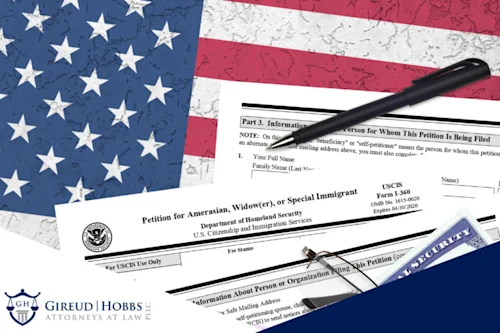Green Cards for VAWA Self-Petitioners
Many people are eligible to apply for their own green cards under the federal Violence Against Women Act, or VAWA.
You don’t have to be a woman to apply for your own green card under this program; you can be any gender. However, you must meet certain criteria. This guide explains the VAWA program and the process for applying for a green card.
What is VAWA?
The federal Violence Against Women Act enables people who have been victimized by a spouse, parent, or child to apply for their own green cards under U.S. immigration law.
How Can You Get a Green Card as a VAWA Self-Petitioner?
Many people choose to work with an attorney when applying for their own green cards, primarily because the application process is different than it would be if your sponsor was applying on your behalf.
Additionally, the paperwork required to apply for your own green card can be complex, and in some cases, confusing. It may be in your best interest to speak to an immigration attorney about this program if you are interested in petitioning for yourself.
If your application is approved, you will receive a green card. With a green card, you can live and work anywhere in the United States.
Who Qualifies as a VAWA Self-Petitioner?
If you are the victim of battery or extreme cruelty committed by a U.S. citizen spouse, former spouse, parent, or son or daughter, you may be eligible to gain lawful permanent residency in the United States.
Additionally, you may qualify if you’re the victim of battery or extreme cruelty committed by a lawful permanent resident spouse or former spouse, or a lawful permanent resident parent.
Eligibility for Adjustment of Status
Not everyone qualifies for adjustment of status; that is, not everyone is eligible to convert a visa to a green card. In order to meet the US government eligibility requirements, you must:
- Be eligible to receive an immigrant visa
- Be physically present in the United States at the time you file your paperwork
- Not be barred from adjusting your status
- Be admissible to the United States for lawful permanent residency or be eligible for a waiver of inadmissibility (or another form of relief)
- Merit the favorable exercise of USCIS’s discretion, which means the USCIS officer in your case believes that the positive factors outweigh the negative factors in your adjustment
Additionally, an immigrant visa must be immediately available to you in order for you to qualify to adjust your status.
Request A Free Consultation Today!
Law Services
Request A Free Consultation Today!
 Are There Bars to Adjustment?
Are There Bars to Adjustment?
First things first: VAWA self-petitioners are exempt from all bars to adjustment. That means, regardless of your situation, USCIS will not prevent you from attempting to adjust your status. (In most immigration cases, there are issues that may prevent a person from adjusting their status from a visa holder to a green card holder. For example, if a person unlawfully entered the United States, or if they committed a violation of immigration law, they may be barred from adjusting status.)
What Are Grounds of Inadmissibility?
Although there are no bars to adjustment for VAWA self-petitioners, you may still have to contend with grounds of inadmissibility. You must be admissible to the United States to qualify for a green card.
However, if you are inadmissible for any reason, you may be able to apply for a waiver of grounds of inadmissibility. Your attorney can help you apply for a waiver if it is necessary in your case.
Note: As a VAWA self-petitioner, all grounds of inadmissibility apply to you except for two. The public charge rule states that if you are likely to become a public charge and rely on public benefits, you are inadmissible to the United States – but it doesn’t apply to you. Entry without inspection doesn’t apply to you, either.
Will Your Spouse Know if You Petition for Yourself?
You can self-petition without your family member’s knowledge or consent. To protect you, U.S. Citizenship and Immigration Services will not alert your family member that you have applied. If USCIS approves your self-petition, and if you meet other eligibility requirements, you may apply to become a lawful permanent resident.
How Can You Apply for a Green Card Under VAWA?
The application process you follow depends on whether you are currently in the United States, you already have a pending Form I-485, or you are outside the United States. Many people choose to work with an attorney during the application process to save time and effort. Additionally, some people find that working with an attorney may reduce the chance of errors on the forms, which can delay the case.
One important thing to note is that if you already have a pending Form I-485 that your abusive family member filed for you, you must notify USCIS. You can do this by getting in touch with the USCIS field office that has the form; you need to let them know that you have filed a VAWA self-petition or that you will do so within the next 30 days.
What Documentation Do You Need?
If you are petitioning the United States government for a green card on your own, you’ll need a number of documents to accompany your petition. Some of those documents include:
- Two passport style photographs
- A copy of your government issued identity document with a photograph
- A copy of your birth certificate
- A copy of your passport page with your nonimmigrant visa and the page with your admission or parole stamp if either applies to you
- Certified police and court records of criminal charges and other legal matters if applicable
Your attorney can let you know what other documentation you need. Be aware that you need to provide this information in a timely manner. Otherwise, you risk delaying your case or having your petition denied by USCIS.
Can Your Family Members Get Green Cards?
Your family members may qualify for green cards under this program. Generally, only unmarried children under 21 years of age can apply. Additionally, each applicant must meet certain eligibility criteria.
Your attorney can file your petition and your children’s petitions at the same time, provided that you are all eligible, immigrant visas are immediately available to each of you, and you are all admissible to the United States for lawful permanent residence (or you are eligible for a waiver of inadmissibility or another form of relief).
Employment Authorization and Advance Parole for VAWA Self-Petitioners
You can apply for employment authorization when you apply for your green card. Additionally, you can apply for an advance parole document that enables you to travel outside the United States while your green card petition is pending. Your attorney can fill out and file all the appropriate paperwork for you.
Do You Need to Talk to an Attorney About Filing a VAWA Self-Petition for a Green Card?
Whether you are a spouse, parent or child who qualifies as a VAWA self-petitioner, we may be able to help you. Call our office or contact us online to schedule a consultation with an attorney who can answer your questions about eligibility and give you guidance on your next steps.

